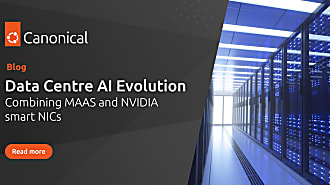Canonical
on 21 October 2020

As part of the effort to build a flexible, cloud-native ready infrastructure, phoenixNAP collaborated with Canonical on enabling nearly instant OS installation. Canonical’s MAAS (Metal-as-a-Service) solution allows for automated OS installation on phoenixNAP’s Bare Metal Cloud, making it possible to set up a server in less than two minutes.
Bare Metal Cloud is a cloud-native ready IaaS platform that provides access to dedicated hardware on demand. Its automation features, DevOps integrations, and advanced network options enable organizations to build a cloud-native infrastructure that supports frequent releases, agile development, and CI/CD pipelines.
Through MAAS integration, Bare Metal Cloud provides a critical capability for organizations looking to streamline their infrastructure management processes.
What is MAAS?
Allowing for self-service, remote OS installation, MAAS is a popular cloud-native infrastructure management solution. Its key features include automatic discovery of network devices, zero-touch deployment on major OSs, and integration with various IaC tools.
Built to enable API-driven server provisioning, MAAS has a robust architecture that allows for easy infrastructure coordination. Its primary components are Region and Rack, which work together to provide high-bandwidth services to multiple racks and ensure availability. The architecture also contains a central postgres database, which deals with operator requests.
Through tiered infrastructure, standard protocols such as IPMI and PXE, and integrations with popular IaaS tools, MAAS helps create powerful DevOps environments. Bare Metal Cloud leverages its features to enable nearly instant provisioning of dedicated servers and deliver a cloud-native ready IaaS platform.
How MAAS on Bare Metal Cloud Works
The integration of MAAS with Bare Metal Cloud allows for under-120-seconds server provisioning and a high level of infrastructure scalability. Rather than building a server automation system from scratch, phoenixNAP relied on MAAS to shorten the go-to-market timeframes and ensure excellent experience for Bare Metal Cloud users.
Designed to bring the cloud experience to bare metal platforms, MAAS enables Bare Metal Cloud users to get full control over their physical servers while having cloud-like flexibility. They can leverage a command line interface (CLI), a web user interface (web UI), and a REST API for querying the properties, deploying operating systems, running custom scripts and initiating reboot the servers.
“phoenixNAP’s Bare Metal Cloud demonstrates the full potential of MAAS,” explained Adam Collard, Engineering Manager, Canonical. “We are excited to support phoenixNAP’s growth in the ecosystem and look forward to working with them to accelerate customer deployments.”
Bare Metal Cloud Features and Usage
The capabilities of MAAS enabled phoenixNAP to automate the server provisioning process and accelerate deployment timeframes of its Bare Metal Cloud. The integration also helped ensure advanced application security and control with consistent performance.
“Incredibly robust and reliable, MAAS is one of the fundamental components of our Bare Metal Cloud,” said Ian McClarty, President of phoenixNAP. “By enabling us to automate OS installation and lifecycle processes for various instance types, MAAS helped us accelerate time to market. We can now offer lightning-fast physical server provisioning to organizations looking to optimize their infrastructure for agile development lifecycles and CI/CD pipelines. Working with the Canonical team was a pleasure at every step of the process, and we look forward to new joint projects in future.”
Bare Metal Cloud is designed with automation in focus and integrates with the most popular IaC tools. It allows for a simple server deployment in under-120-seconds server provisioning, which is enabled by MAAS OS installation automation capabilities. In addition to this, it includes a range of features designed to support modern IT demand and DevOps approaches to infrastructure creation and management.
Bare Metal Cloud Features
- Single-tenant, non-virtualized environment
- Fully automated, API-driven server provisioning
- Integrations with Terraform, Ansible, and Pulumi
- SDK available on GitHub
- Pay-per-use and reserved instances billing models
- Dedicated hardware — no “noisy neighbors”
- Global scalability
- Cutting edge hardware and network technologies
- Built with market proven and well-established technology partners
- Suited for developers and business critical production environments alike
Looking to deploy a Kubernetes cluster on Bare Metal Cloud?



